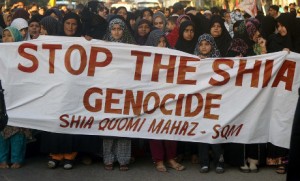Afghan refugees harassed in Pakistan and Iran
 Members of Melbourne’s large Afghan community are concerned over warnings from the United Nations and human rights groups that Afghan refugees in Pakistan and Iran are increasingly becoming targets for extortion, beatings, harassment and illegal detention.
Members of Melbourne’s large Afghan community are concerned over warnings from the United Nations and human rights groups that Afghan refugees in Pakistan and Iran are increasingly becoming targets for extortion, beatings, harassment and illegal detention.
Thousands of Afghans, particularly ethnic Hazara, who are Shias, have been attacked or murdered by militant Islamist groups such as the Taliban or Lashkar-e-Jhangvi in recent years.
But these new incidents of persecution are at the hands of Pakistani officials, the UN has reported.
And independent advocacy group Human Rights Watch says Afghans fleeing to Iran also face increasing persecution by the Iranian government.
Expatriate Afghani community leader Ali Hussein says the Hazara people have already been subjected to what is effectively genocide.
“There is a genocide being waged against our people and it is getting worse every day,” Mr Husseini said.
“Having the Pakistani authorities harass people also just makes matters worse,” he said.
“This just adds to the concerns we have for our families and friends about our fellow Hazaras in Pakistan,” Mr Hussein said.
The UN refugee agency warned this month that Afghan refugees in Pakistan are increasingly becoming victims of extortion, illegal detention and harassment. Pakistan has taken in millions of Afghans since the Soviet invasion in 1979 and has some 1.6 million registered Afghan refugees.
According to the United Nations High Commissioner for Refugees, hundreds of registered Afghan refugees have recently been illegally swept up and briefly held by Pakistani authorities during security operations.
UN representative Neill Wright said most of the arrests came during operations in Pakistan’s restive southwestern province of Baluchistan and the southern city of Karachi, mainly because of institutional delays in updating refugee status cards.
“Normally every month there would be just a small number of arrests and releases,” Mr Wright said.
“However in the last two or three months, particularly in the two operations that I mentioned, these numbers have gone up into the hundreds every week or every month, so the number has significantly increased,” he said.
A report by New York-based rights group Human Rights Watch details the growth in arbitrary arrests, detentions, beatings and harassment of more than a million Afghans as Iran faces its own economic problems worsened by international sanctions.
“In recent years conditions have worsened and pressures increased for nearly all Afghans in Iran,” the group said.
“They face higher barriers to humanitarian aid and social services, arbitrary arrest and detention, and have little recourse when abused by government or private actors.”
The Pakistan government, in its second extension since December 2012, recently said that registered Afghan refugees can legally remain in Pakistan until December 2015. However, many refugees are holding expired identity cards – leading to mistaken detention and abuse.
Pakistan Ministry of States and Frontier Regions spokesman Imran Zeb acknowledged that in some cases local security forces were taking advantage of the situation.
“For example, if there is a man traveling on a bus, and if any security person or any police constable comes and asks for his identification, and he does not have one, or has, as I said an invalid card, so he is taken down from the bus and taken aside,” Mr Zeb said.
Millions of refugee Afghans poured over the border into Pakistan when the Soviet Union invaded Afghanistan in 1979, and more joined them when the Taliban took over in the late 1990s. In the last 10 years, some 3.8 million have been repatriated, but Pakistan still hosts more than one and a half million authorized Afghan refugees.
“There are 1.61 million registered Afghan refugees in Pakistan today, and some of them were issued their PoR [Proof of Registration] cards in 2010 in different locations from where they are living today,” Mr Wright said.
He said that issuing renewed cards was not a simple process.
“You can imagine the logistics and the cost of replacing all of those cards,” he said.
The UNHCR and the government of Pakistan have set up complaint cells and a hotline for those authorized refugees who need help.












